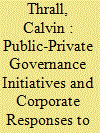| Srl | Item |
| 1 |
ID:
179866


|
|
|
|
|
| Summary/Abstract |
Multinational firms operate in multiple national jurisdictions, making them difficult for any one government to regulate. For this reason the firms themselves are often in charge of their own regulation, increasingly in conjunction with international organizations by way of public-private governance initiatives. Prior research has claimed that such initiatives are too weak to meaningfully change firms’ behavior. Can public-private governance initiatives help firms self-regulate, even if they lack strong monitoring or enforcement mechanisms? I take two steps toward answering this question. First, I introduce a new measure of firms’ performance on ESG (environmental, social, and governance) issues: the extent to which the firms issue public responses to claims of misconduct from civil society actors. Second, I argue that public-private governance initiatives allow firms to benefit from the legitimacy of their public partners, lowering the reputational cost of transparent response. Employing novel data on firm responses to human rights allegations from the Business and Human Rights Resource Center, I find that membership in the largest and most prominent initiative, the United Nations Global Compact, significantly increases firms’ propensity to respond transparently to stakeholder allegations. These results suggest a limited but important role for public-private initiatives in global governance.
|
|
|
|
|
|
|
|
|
|
|
|
|
|
|
|
| 2 |
ID:
092258


|
|
|
|
|
| Publication |
2009.
|
| Summary/Abstract |
Despite new interest in the implications of growing institutional density for international cooperation, and in so-called public-private governance, the interplay between public and private regimes has so far been largely overlooked. This article draws on the emerging literature on parallel regimes in international governance to analyze the evolution of the norms and rules governing sovereign debt restructuring from the early 1980s to the mid-2000s, with a particular focus on the interplay between those covering official bilateral (or Paris Club) debt, and those dealing with private credits. It shows how, from the mid-1990s onward, changes in market and political environments turned burden sharing between bilateral and private creditors into a contentious issue, partly undermining the existing framework for public-private cooperation, and confirms that a focus on institutional interplay can help identify some of the key dynamics behind public-private cooperation.
|
|
|
|
|
|
|
|
|
|
|
|
|
|
|
|